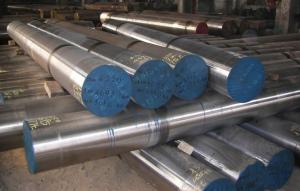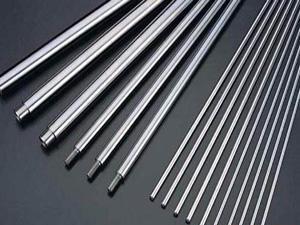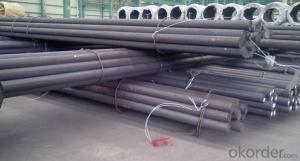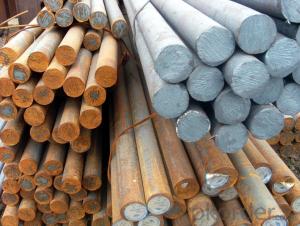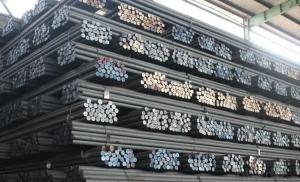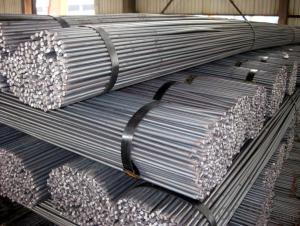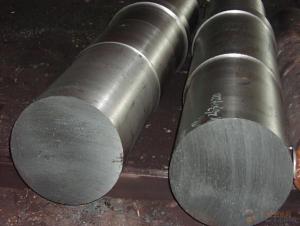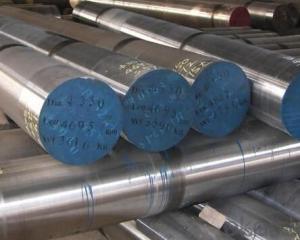Special Steel Round Bar for Bearing
- Loading Port:
- China Main Port
- Payment Terms:
- TT or LC
- Min Order Qty:
- -
- Supply Capability:
- -
OKorder Service Pledge
OKorder Financial Service
You Might Also Like
Product Description:
OKorder is offering Bearing steel at great prices with worldwide shipping. Our supplier is a world-class manufacturer of steel, with our products utilized the world over. OKorder annually supplies products to European, North American and Asian markets. We provide quotations within 24 hours of receiving an inquiry and guarantee competitive prices.
Product Applications:
Bearing steel is used for manufacturing ball, roller bearing steel and rings. Bearing in work is under great pressure and friction, so have high demands bearing steel and hardness and resistance, and high elastic limit.
Bearing steels are used for ball and roller bearing applications and are comprised of low carbon steels and high carbon through harden able steel.
For example, bearing ring, steel rolling mill, machinery, 100Cr6 bearing steel ball is widely used in high-speed and low-noise bearing, bicycle, motorcycle, automobile, bags electronically.
Product Advantages:
OKorder's Bearing steel are durable, strong, and resist corrosion.
Main Product Features:
· Premium quality
· Prompt delivery & seaworthy packing (30 days after receiving deposit)
· Corrosion resistance
· Can be recycled and reused
· Mill test certification
· Professional Service
· Competitive pricing
Product Specifications:
Grade | bearing steel EN-31 |
Dimensions | Diameter: 20-280mm Length: 2000-5800mm |
Shape | Round Bar |
Type | High chromium bearing steel |
HBS | <220 |
Standard | AISI |
Technique | Hot Rolled |
FAQ:
Q1: Why buy Materials & Equipment from OKorder.com?
A1: All products offered byOKorder.com are carefully selected from China's most reliable manufacturing enterprises. Through its ISO certifications, OKorder.com adheres to the highest standards and a commitment to supply chain safety and customer satisfaction.
Q2: How do we guarantee the quality of our products?
A2: We have established an advanced quality management system which conducts strict quality tests at every step, from raw materials to the final product. At the same time, we provide extensive follow-up service assurances as required.
Q3: How soon can we receive the product after purchase?
A3: Within three days of placing an order, we will begin production. The specific shipping date is dependent upon international and government factors, but is typically 7 to 10 workdays.
Images:
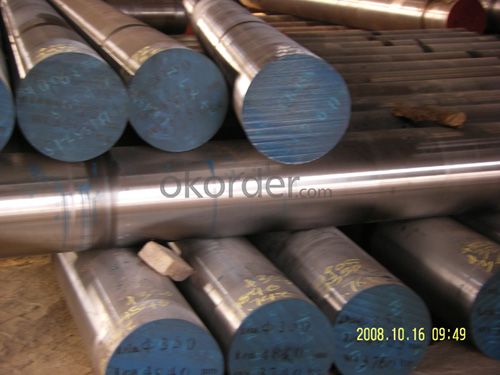
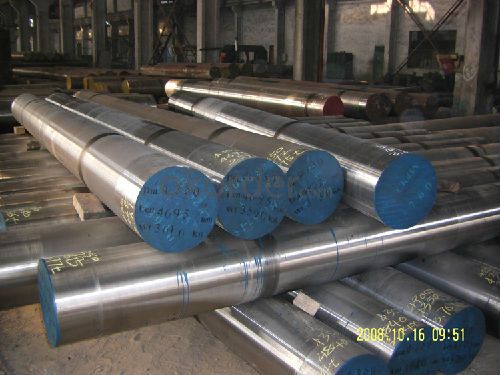
- Q: What are the different cutting tools used for machining special steel?
- Some of the different cutting tools used for machining special steel include high-speed steel (HSS) drills, carbide drills and end mills, diamond-coated tools, and solid carbide inserts. These tools are specifically designed to withstand the high cutting forces and temperatures associated with machining special steel, ensuring efficient and precise metal removal.
- Q: What are the requirements for special steel used in low-temperature applications?
- The requirements for special steel used in low-temperature applications include high toughness, excellent resistance to brittle fracture, and good ductility at low temperatures. It should have a low carbon content to prevent embrittlement, along with specific alloying elements like nickel, manganese, and chromium to enhance its low-temperature properties. Additionally, the steel should have good weldability and corrosion resistance to withstand the harsh conditions often encountered in low-temperature environments.
- Q: What are the main applications of special steel in the power distribution industry?
- Special steel is widely used in the power distribution industry for various applications. One of the main applications is in the construction of transmission towers and electrical pylons. Special steel is preferred for these structures due to its high strength, durability, and resistance to corrosion. It ensures the safe and reliable transmission of electricity over long distances. Special steel is also used in the manufacturing of electrical transformers and generators. The steel's magnetic properties make it suitable for creating efficient and reliable power generation and distribution equipment. Additionally, special steel is used in the production of electrical connectors and conductors, which are essential for ensuring the efficient flow of electricity through power distribution systems. Overall, the main applications of special steel in the power distribution industry include transmission towers, electrical pylons, transformers, generators, and electrical connectors. These applications play a crucial role in maintaining a robust and reliable power grid, ensuring uninterrupted electricity supply to consumers.
- Q: What are the main characteristics of electrical steel forgings?
- Electrical applications greatly benefit from the numerous advantageous features possessed by electrical steel forgings. Firstly, their low core loss property minimizes energy loss as heat during the magnetic cycle, making them exceptionally suitable for devices like transformers, motors, and generators. Consequently, the overall efficiency and performance of these devices are significantly enhanced. Secondly, electrical steel forgings exhibit high magnetic permeability, enabling them to conduct magnetic flux with ease. This attribute facilitates effective magnetic induction and maximizes the strength of the magnetic field in electrical components. As a result, energy conversion and transmission are efficiently achieved. Moreover, electrical steel forgings possess low coercivity, indicating that they require minimal magnetic field strength for magnetization and demagnetization. This characteristic results in quicker and more precise magnetic switching in electrical devices, leading to improved performance and reduced energy losses. Additionally, electrical steel forgings possess high electrical resistivity, which effectively restricts the flow of electrical current and diminishes energy losses due to eddy currents. This attribute is particularly vital in applications where electrical steel forgings are subjected to rapidly changing magnetic fields, such as in power transformers. Lastly, to further enhance their electrical performance and prevent short circuits or electrical leakage, electrical steel forgings are often treated with surface insulation coatings or coatings with high electrical resistivity. In conclusion, electrical steel forgings offer a range of essential characteristics including low core loss, high magnetic permeability, low coercivity, high electrical resistivity, and the ability to be coated for insulation. These properties make them indispensable in various electrical applications, ensuring efficient energy conversion, reduced losses, and reliable performance.
- Q: How does special steel contribute to the pharmaceutical industry?
- Special steel plays a crucial role in the pharmaceutical industry by offering exceptional strength, corrosion resistance, and durability. It is used in the manufacturing of various equipment and components such as storage tanks, reactors, piping systems, and precision instruments. The unique properties of special steel ensure the integrity and purity of pharmaceutical products, prevent contamination, and enable efficient and safe production processes.
- Q: What are the different surface finishing techniques for special steel parts?
- There are several surface finishing techniques for special steel parts, including electroplating, powder coating, painting, polishing, and passivation. Each technique offers unique benefits and can be chosen based on the desired appearance, corrosion resistance, durability, and functionality of the steel parts.
- Q: How is high-strength stainless steel used in the production of structural components?
- High-strength stainless steel is commonly utilized in the production of structural components due to its remarkable properties. Its high tensile strength, corrosion resistance, and durability make it ideal for constructing critical load-bearing structures such as bridges, buildings, and infrastructure. Additionally, the stainless steel's ability to withstand extreme environmental conditions and its aesthetic appeal further enhance its usage in various structural applications.
- Q: Can special steel be used in the semiconductor manufacturing industry?
- Yes, special steel can be used in the semiconductor manufacturing industry. Special steel, such as stainless steel or tool steel, is commonly employed in various applications within the semiconductor industry. It is used for making equipment and components that require high levels of cleanliness, corrosion resistance, and precision. Special steel alloys are often utilized in the fabrication of semiconductor processing tools, vacuum chambers, wafer carriers, and other critical parts to ensure optimal performance and reliability in the manufacturing process.
- Q: What are the different surface hardening methods used for special steel?
- Special steel can be enhanced in hardness and wear resistance through various surface hardening methods. These techniques are employed to cater to specific applications. Some commonly utilized methods for surface hardening special steel are as follows: 1. Carburizing: By introducing carbon into the steel's surface via heating it in a carbon-rich environment, such as a carbon-containing gas or liquid, carburizing is performed. The steel absorbs the carbon, resulting in a high-carbon layer on the surface. This process enhances the steel's hardness and wear resistance, making it suitable for applications demanding strength and durability. 2. Nitriding: Nitriding involves introducing nitrogen into the steel's surface. This is achieved by heating the steel in an atmosphere of ammonia gas. The nitrogen diffuses into the steel, forming a nitride layer on the surface. Nitrided steel exhibits increased hardness, improved wear resistance, and enhanced fatigue strength. It is commonly used in applications requiring high surface hardness, like gears, bearings, and tools. 3. Induction hardening: Induction hardening is a localized surface hardening method that entails heating specific areas of the steel using electromagnetic induction. The heated regions are then rapidly quenched, resulting in a hardened surface layer. Induction hardening is employed for components demanding high surface hardness, such as shafts, gears, and camshafts. It provides precise control over the hardened area, leading to improved wear resistance and fatigue strength. 4. Flame hardening: Flame hardening involves heating the steel surface using a high-temperature flame and quickly quenching it. This process creates a hard surface layer while leaving the core of the steel relatively unchanged. Flame hardening is commonly used for large and intricately shaped components, including axles, crankshafts, and machine tool slides. 5. Laser hardening: Laser hardening is a precise and localized surface hardening method that utilizes a high-energy laser beam to heat and melt the steel's surface. By moving the laser beam across the surface, a hardened layer is formed. Laser hardening provides precise control over the hardened area, resulting in improved wear resistance and fatigue strength. It is commonly applied to small and intricate components, such as cutting tools, molds, and dies. These are merely a few examples of the surface hardening methods frequently employed for special steel. Each method offers distinct advantages and is selected based on the specific requirements of the application. By utilizing these surface hardening techniques, special steel can be customized to meet the needs of various industries, including automotive, aerospace, and manufacturing.
- Q: How does special steel perform in terms of thermal expansion?
- Special steel typically performs well in terms of thermal expansion. It has a low coefficient of thermal expansion, meaning it expands and contracts less with temperature changes compared to other types of steel. This makes it more dimensionally stable and less prone to warping or distortion when exposed to heat or cold.
Send your message to us
Special Steel Round Bar for Bearing
- Loading Port:
- China Main Port
- Payment Terms:
- TT or LC
- Min Order Qty:
- -
- Supply Capability:
- -
OKorder Service Pledge
OKorder Financial Service
Similar products
Hot products
Hot Searches
Related keywords
